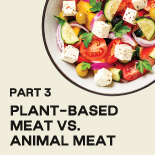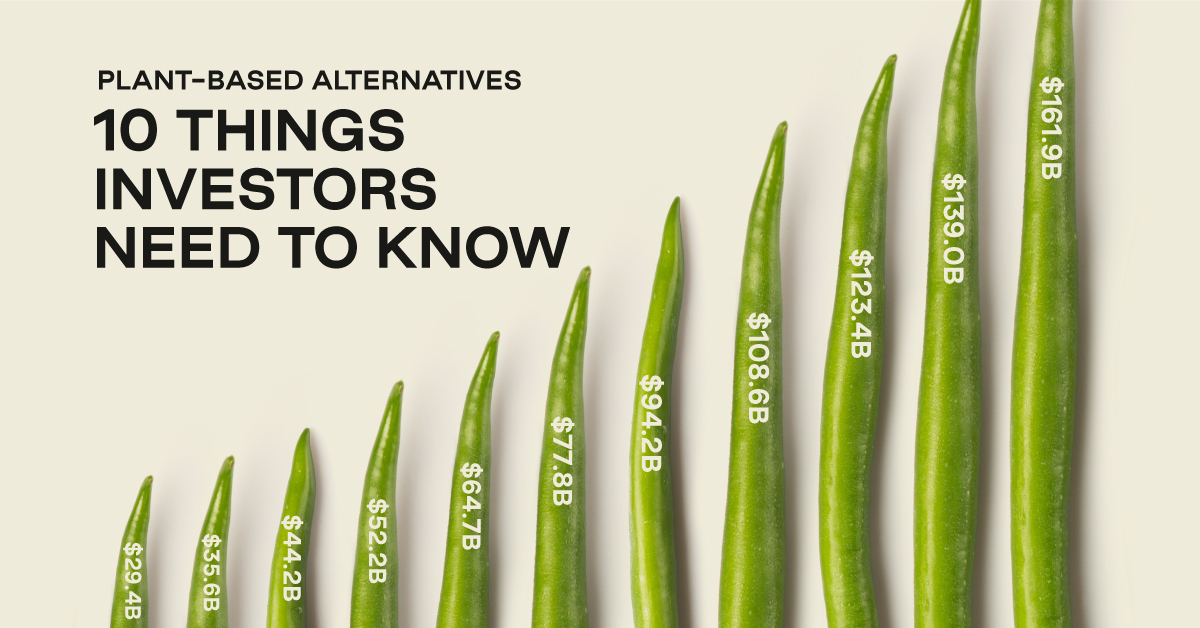10 Things Investors Should Know about the Plant-Based Foods Market
What Investors Should Know about the Plant-Based Foods Market
Plant-based foods are gaining traction—and fast.
By 2030, the global plant-based food market is expected to reach $161.9 billion in value. That’s a 355% increase compared to 2021.
Interested in investing in this rapidly expanding industry? This graphic from The Very Good Food Company (VGFC) highlights what you should know on the future of the plant-based food market.
1. Consumers are Becoming More Health Conscious
As plant-based foods grow in popularity and more product options become available, consumers have started to become more selective about the types of products they’re willing to purchase.
For many consumers, health is a key consideration when making purchasing decisions. A global survey revealed that, out of 8,500 respondents, over 50% were vegan for health reasons.
But not just any plant-based product will cut it. Consumers are starting to hold businesses to a higher standard, with an expectation that plant-based products have high nutritional value, low salt content, and good quality protein.
2. Consumers are Becoming More Socially Conscious
Consumers are also becoming more educated on environmental issues, and how plant-based diets can help reduce greenhouse gas emissions. According to the same survey as above, almost two-thirds (64%) of respondents were vegan for environmental and sustainability reasons.
Some experts believe this figure will only increase, as the impacts of climate change become more apparent across the globe.
3. An Influx in Plant-Based Tech Innovation
With consumer demand growing and expectations for the plant-based food industry evolving, new technological advancements in this space are rapidly emerging.
For instance, the cell-cultured meat market is gaining traction fast. Cell-culture meat is meat that’s grown in a lab from the cells of animals. It’s biologically identical to traditional meat.
While cell-cultured meat has yet to hit the commercial market on a mass scale, several start-ups have gone public, such as MeaTech3D, Mosa Meat, and UPSIDE Foods. Recently, MeaTech announced its plans to start pre-production of cell-cultured chicken fat by 2022.
In the next 20 years, cell-cultured meat usage is expected to skyrocket. In fact, it could make up 35% of the global meat market by 2040, which would cause conventional meat’s market share to decrease drastically.
4. Diversifying Plant-Based Market
In addition to meat alternatives, other plant-based alternatives are gaining popularity as well, especially egg substitutes and spreads. In 2020, plant-based egg sales in the U.S. reached $27 million, a 167.8% increase compared to the year prior.
| Category | 2020 Sales | YoY growth |
|---|---|---|
| Plant-based eggs | $27 million | 167.80% |
| Plant-based milk | $2.5 billion | 20.40% |
| Plant-based cheese | $270 million | 42.50% |
| Plant-based spreads, dips, sauces | $61 million | 83.40% |
While egg substitutes and spreads are growing fast, plant-based milk remains the most popular product category when it comes to overall sales, making up 35% of the total plant-based foods market.
5. Retailers Push Plant-Based
Retailers are starting to take note of the rising popularity of plant-based products, and are integrating plant-based foods into their offerings as a result.
For example, Tesco, the UK’s biggest grocery store brand, expects to see sales of plant-based products grow 300% by 2025. And Unilever, one of the world’s largest food and beverage manufacturers, expects to generate $1.2 billion from plant-based meat and dairy sales in the next five to seven years—around 5x more than their 2020 sales revenue for alternatives.
6. Plant-Based Companies are Growing Fast
Since the market is booming, many plant-based food companies are experiencing significant growth. For instance, The Very Good Food Company, a Canadian plant-based food company, saw its revenue increase by 680% from Q1 2020 to Q1 2021.
In that same timeframe, VGFC’s product sales increased by 77%, and its eCommerce sales increased by 1744%. More growth is on the horizon since the company recently closed a $70 million loan agreement with Waygar Capital and Ninepoint Partners to help expand operations.
7. More Consumers are Becoming Flexitarians
Not everyone is transitioning to a fully plant-based lifestyle.
As the benefits of plant-based diets become more apparent, more people are starting to limit their meat intake, or have become flexitarians—people who primarily eat a plant-based diet, but occasionally eat meat or fish.
In fact, almost one-third of Americans have reduced their meat and dairy consumption, and consider themselves flexitarians.
| Category | % of Survey Respondents |
|---|---|
| Omnivore | 65% |
| Flexitarian | 29% |
| Vegetarian | 4% |
| Vegan | 2% |
Being a flexitarian is becoming easier than ever, as plant-based products become more accessible, and the taste of meat alternatives improves.
8. Restaurants are Adopting More Plant-Based Options
Because of consumer demand, restaurants are adjusting and creating more inclusive menus with diverse vegan, vegetarian, and dairy-free options for their guests.
A&W, a popular Canadian fast-food chain, launched its plant-based burger back in 2018. Because of its popularity, the restaurant is expanding its plant-based menu options by adding Beyond Meat nuggets to the menu.
9. Younger Generations are Prioritizing Plant-Based Eating
The plant-based movement has been largely driven by younger generations.
In a survey of over 1,200 respondents, 22% of Millennials said they’d adopted a vegetarian lifestyle at some point in their lives, compared to just 13% of Gen Xers, and 11% of Baby Boomers.
And many Millennials, even if they haven’t gone full plant-based, were attempting to limit their meat intake—45% of Millennial respondents claimed they were actively trying to reduce their meat consumption.
Gen Z however are the driving force behind the plant-based movement with 79% of them claiming to eat plant-based once or twice per week.
10. Governments Are Supporting the Plant-Based Industry
Independent businesses aren’t the only players getting behind the plant-based boom—governments are stepping up to support this rapidly growing industry as well.
For example, the Canadian government recently announced plans to invest $150 million in the plant-based foods industry, signing a deal with Protein Industries Canada. This funding will go towards plant-based food manufacturing, research and development, and tech innovation.
The Future is Plant-Based
There are multiple drivers supporting the rapidly growing plant-based food industry, and because of this, more growth is expected in the near future.
Companies like VGFC are at the forefront of this movement, providing products that don’t sacrifice taste and aren’t highly processed.
Click here to learn more about the VGFC and their wide array of product offerings.

-

 Sponsored3 years ago
Sponsored3 years agoMore Than Precious: Silver’s Role in the New Energy Era (Part 3 of 3)
Long known as a precious metal, silver in solar and EV technologies will redefine its role and importance to a greener economy.
-

 Sponsored7 years ago
Sponsored7 years agoThe History and Evolution of the Video Games Market
Everything from Pong to the rise of mobile gaming and AR/VR. Learn about the $100 billion video games market in this giant infographic.
-

 Sponsored8 years ago
Sponsored8 years agoThe Extraordinary Raw Materials in an iPhone 6s
Over 700 million iPhones have now been sold, but the iPhone would not exist if it were not for the raw materials that make the technology…
-

 Sponsored8 years ago
Sponsored8 years agoThe Industrial Internet, and How It’s Revolutionizing Mining
The convergence of the global industrial sector with big data and the internet of things, or the Industrial Internet, will revolutionize how mining works.









